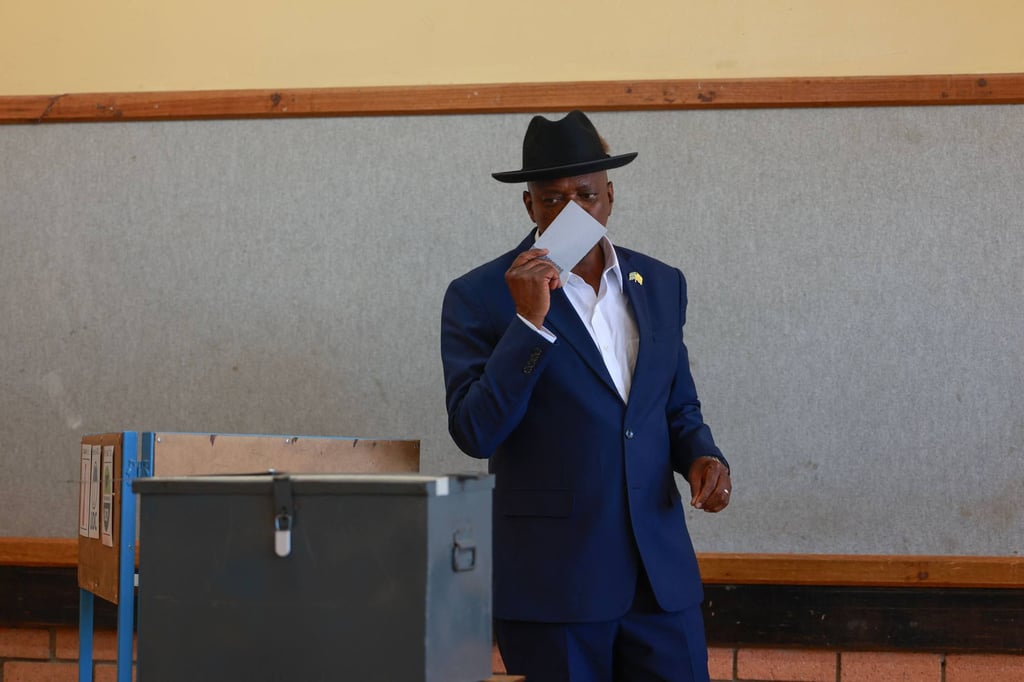Botswana’s President Masisi Concedes Election Defeat, Ending BDP’s 58-Year Rule
Botswana has witnessed a seismic shift in its political landscape as President Mokgweetsi Masisi of the Botswana Democratic Party (BDP) conceded defeat in the national election, marking the end of the BDP’s uninterrupted 58-year reign. Preliminary results revealed that the party, which has governed since Botswana’s independence in 1966, has lost its parliamentary majority, with the main opposition party, the Umbrella for Democratic Change (UDC), emerging as the frontrunner.
The concession on Friday by President Masisi came even before the final results were officially confirmed by the electoral commission. The BDP trailed significantly, sitting in fourth place, a surprising outcome that has reverberated throughout Botswana and beyond.
Masisi’s Concession and Recognition of the People’s Will
Addressing a news conference in Botswana’s capital, Gaborone, President Masisi admitted the ruling party’s shortcomings and acknowledged the clear message from the people. “We got it wrong big time in the eyes of the people,” Masisi stated candidly. “We were really convinced of our message. But every indication, by any measure, is that there’s no way that I can pretend that we’re going to form a government.”
Having sought a second five-year term, Masisi expressed his willingness to step aside and congratulated the opposition on their electoral success. “I wish to congratulate the opposition on their victory and concede the election,” he said. Masisi’s humility in accepting defeat has underscored Botswana’s reputation as one of Africa’s most stable democracies.
Parliamentary Threshold and Botswana’s Electoral System
Botswana’s electoral framework stipulates that the first party to secure 31 of the 61 parliamentary seats is entitled to form the government and elect its candidate as president. The opposition UDC, led by human rights lawyer Duma Boko, is well-positioned to assume power, with official counts showing the party had already secured 25 seats and was nearing the majority threshold.
Boko, age 54, a seasoned political figure and human rights advocate, has run for the presidency twice before, in 2014 and 2019. His party, the UDC, which he formed in 2012 to unite opposition forces, has gained substantial traction over the years, positioning itself as a credible alternative to the BDP. Celebrating his party’s lead, Boko took to social media with the message, “CHANGE IS HERE,” as small gatherings and celebrations began in parts of Gaborone.
The BDP’s Decline and Botswana’s Economic Challenges
For over half a century, the BDP has held power, transforming Botswana into one of Africa’s success stories through a blend of sound governance and economic growth, largely driven by the country’s diamond wealth. However, recent economic strains have significantly challenged the BDP’s dominance. The International Monetary Fund (IMF) forecasts Botswana’s economic growth to slow to 1 percent in 2024, down from 2.3 percent in 2023 and 5.5 percent in 2022. As diamonds make up more than 80 percent of the nation’s exports, a global downturn in diamond demand has exacerbated these issues, underscoring the need for economic diversification.
Adding to Botswana’s challenges is a high unemployment rate, which now stands at 27 percent, with even higher rates among youth. These economic pressures, coupled with a lack of diversified revenue streams, contributed to the electorate’s growing discontent. The BDP had acknowledged these issues in its campaign and pledged to shift toward sectors such as agriculture and tourism, aiming to reduce Botswana’s dependency on diamond exports.
In his concession statement, President Masisi noted the importance of Botswana’s democratic processes. “Although I wanted a second term, I will respectfully step aside and participate in a smooth transition process,” he remarked, demonstrating his commitment to a peaceful transfer of power.
The Role of Other Opposition Parties
Aside from the UDC, other opposition parties have also gained significant ground. The Botswana Congress Party, another key player in this election, secured seven seats, while the Botswana Patriotic Front won five seats. By contrast, the BDP was left with a mere three seats in the partial tally, indicating a monumental shift in the political tide. With the BDP officially losing its parliamentary majority, the results are being seen as a historic mandate for change from Botswana’s electorate.
A Momentous Shift in Botswana’s Political Landscape
This election marks a significant turning point for Botswana, a country widely recognized for its peaceful political transitions and robust democratic foundations. The BDP’s defeat signals an end to its long-standing dominance and reflects a growing appetite among citizens for political reform and fresh leadership. With the UDC poised to assume control, many anticipate a shift in governance priorities, particularly around economic development, diversification, and addressing unemployment.
Boko, a respected human rights lawyer, is expected to bring a reform-oriented agenda to the presidency. His victory represents a new chapter in Botswana’s history, with promises to enhance governance, foster economic stability, and address the urgent needs of the population.
A Look Ahead: What’s Next for Botswana
As the UDC prepares to form a government, the challenges they face are substantial. Addressing economic stagnation, reducing dependency on diamond exports, and creating employment opportunities for Botswana’s youth will be top priorities. The new leadership will also need to navigate the economic repercussions of global market shifts and ensure that Botswana remains on a stable economic footing.
Moreover, the peaceful concession by President Masisi and his acceptance of the opposition’s victory have set a strong example in the region, underscoring Botswana’s commitment to democratic values. More than one million voters participated in this election out of a population of 2.6 million, reflecting the engaged and informed nature of the electorate.
The UDC’s anticipated victory in Botswana’s 2023 election is a defining moment for the nation. It demonstrates both the strength of Botswana’s democratic system and the people’s desire for a government that addresses current economic challenges while steering the country toward a diversified and resilient future. As the final results are confirmed and the transition of power begins, Botswana stands poised for a new era, one that reflects the aspirations and needs of its people.
Source : Swifteradio.com


